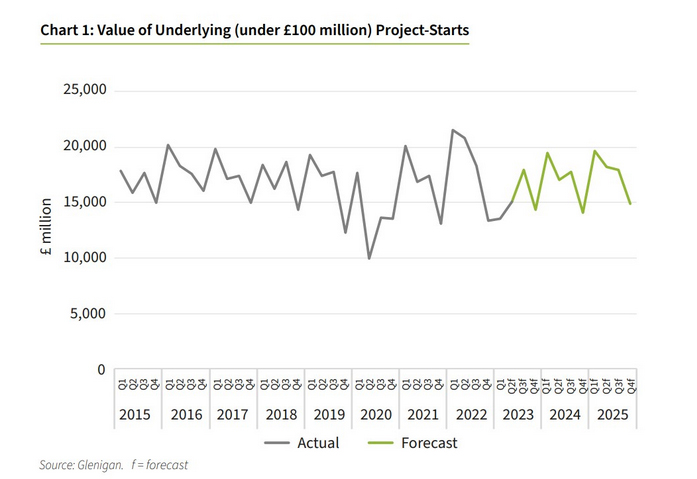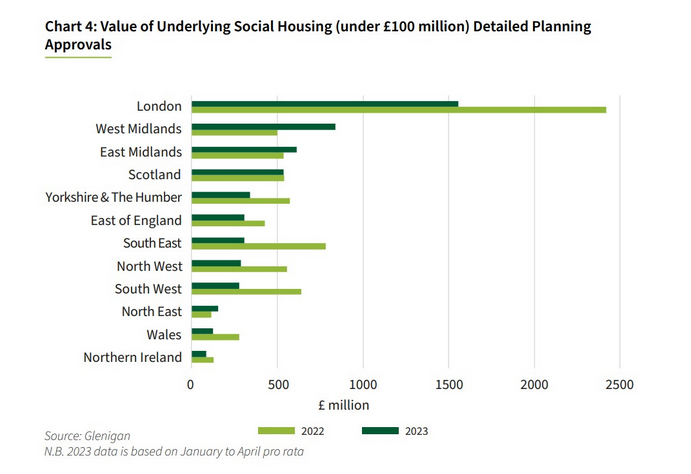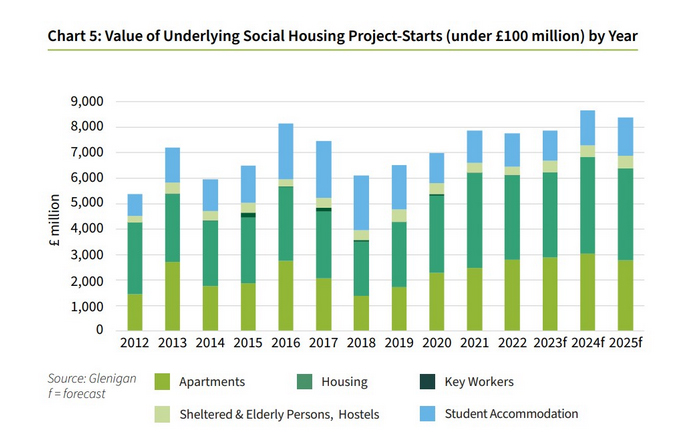Glenigan, one of the construction industry’s leading insight and intelligence experts, has released its widely anticipated UK Construction Industry Forecast 2023-2025.
The key takeaway from this Forecast, which focuses on the next three years (2023-2025), is that the construction industry will struggle in the face of extremely challenging economic conditions, with predicted declines of 18% during 2023.
However, there’s recovery in the not-so-distant future, with a 12% increase predicted in 2024, and 3% in 2025.

Significant disruption stifles short-term growth
Overall, UK Construction starts fell sharply during the first four months of this year, as the fallout from last autumn’s mini-budget and a weak outlook dented investor and consumer confidence.
Ongoing conflict in Eastern Europe, materials shortages and cost inflation, and, more recently, spiking interest rates, are expected to delay work moving to site for the remainder of the year, with an 18% drop predicted.
Despite a tough start to the year and conditions remaining hard during the final six months of 2023, renewed construction growth is forecast for 2024 and 2025, with firm development pipelines already pulling through to support a rise in industrial and office starts. Improved consumer confidence and real-term wage increases are also expected to feed through to lift activity in consumer-related verticals.
Public sector picks up
Public sector construction is set to be a relative bright spot during 2023, as government departmental capital programmes are boosted by underspend rollover into the current financial year.
However, disruption to project-starts is likely in the run-up to the next general election, and post-election, as a new administration looks to review and consolidate public sector investment programmes currently in the works.
Social housing slips back
The forecast for social housing project-starts is mixed, with starts predicted to remain flat for the duration of 2023 as eye-watering construction materials costs and labour shortages continues to constrain activity. Approvals are similarly expected to fall back over the remainder of the year.

 However, improved funding for affordable housing projects is anticipated in 2024 and is set to buoy the sector, with an 11% growth forecast for the period.
However, improved funding for affordable housing projects is anticipated in 2024 and is set to buoy the sector, with an 11% growth forecast for the period.
Higher borrowing costs are also likely to dampen student accommodation starts, near term, but improved investor confidence in 2024 is expected to counteract this, lifting starts.
Commenting on the Forecast, Glenigan’s Economic Director Allan Wilen said: “The pattern of UK construction activity is being reshaped by economic slowdown and structural changes, while new regulations are transforming how projects are delivered. We are still in a state of extreme uncertainty, and the industry is set for a challenging period over the coming year.
Allan continued: “Higher construction costs are expected to constrain social housing starts for the duration of 2023, despite increased funding for affordable housing. Additionally, the slowdown in the private housing market will have a knock-on effect on opportunities for associations to move forward with larger, mixed tenure, developments in partnership with other developers. However, growth is forecast to accelerate next year as housing associations press on with their development plans, while a brighter economic outlook should also increase the viability of mixed-tenure sites.”
 To request a copy of Glenigan’s UK Construction Industry Forecast 2023-2025 click here.
To request a copy of Glenigan’s UK Construction Industry Forecast 2023-2025 click here.










